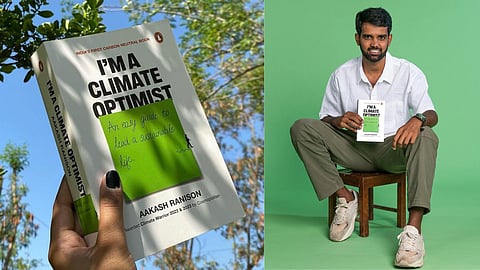
- HOMEGROWN WORLD
- #HGCREATORS
- #HGEXPLORE
- #HGVOICES
- #HGSHOP
- CAREERS
- ABOUT US
- CONTACT US

It’s been getting gloomier. Climate change has now permeated the elementary school syllabus and young individuals like Greta Thunberg or nationwide movements like the Extinction Rebellion have been raising the ante on policymakers (and rightly so) to take swift action towards reducing the carbon footprint and mitigating global warming. As a result, a significant measure of fatalism has crept into our movies, social media and political discourse. Books like The Uninhabitable Earth: Life After Warming or The Ministry for the Future are recreating extreme possibilities of where we are headed if we keep ignoring the climate crisis. The conservatives in the U.S. have a new comeback for this frenzy and it’s called “OK Doomer”.
Underpinning this alarmism is a very real climate anxiety and according to an extensive recent survey conducted among millennials from 10 different countries, including India, over 75% said the future is frightening and 83% lamented about how humans have failed the planet. Though some of this stress can keep the engine running and prevent us from getting complacent, overwhelming pessimism on the other hand, can lead very quickly to giving up and shutting down. Such is human nature.
Miles away from the counterproductive skirmishes between fear mongering and climate deniers, there’s a new crop of salt-of-the-earth and level headed entrepreneurial activists blooming in South Asia, among them Aakash Ranison who recently published 'India’s first carbon neutral book' titled I’m a Climate Optimist.
Trekking all the way up to the world's highest village in Spiti, Himachal Pradesh and surrounded by the austerity of snow-clad mountains, Aakash launched his book on World Environment Day this year.
Testament to how relentlessly he has wrestled with his paralysing climate anxiety, I’m a Climate Optimist is the tangible product of his solution-oriented and pragmatic approach. Where others see a crisis, Aakash recognises a challenge.
He has written an eminently readable compendium on sustainable living that traces the journey of the products and services we consume on a day-to-day basis by devoting entire sections to diverse walks of life including textiles, cosmetics, public transport, food and beverages etc.
Each of these chapters are bookended with commentary from over 45 industry experts including Piyush Pandey (Ogilvy), Dia Mirza (UNEP), Nithin Kamath (Zerodha), Shriti Malhotra (The Body Shop) and Rahul Mishra (fashion designer) among others and comprehensive accounts of climate-sensitive business practices from across 100 homegrown companies.
“I am an optimist, and I have seen the world change many times over without crumbling under the pressure of what is to come.”
Aakash Ranison
Published by Penguin Random House (India) and printed on eco-friendly paper, which is Forest Stewardship Council (FSC)-certified, this book scores bonus points for using vegetable ink. The author has also pledged 100% of his royalties towards a climate charity, the Greener Earth Foundation, to invest in sustainable projects thereby honourably countervailing the carbon footprint made in producing the book.
Made from a variety of organic compounds, including linseed, canola, and sunflower oil; vegetable inks can be broken down easily and replenished innumerable times. The inks from vegetables and soy emit less greenhouse gases compared to inks derived from petroleum.
According to a study done in 2012, the cradle-to-gate production of a single paperback could release about 2.7 kg of carbon dioxide into the environment. Increasingly, publishers around the world are being compelled to make the industry — from the pulp mill to the recycling of a book post-consumption — more energy efficient and eco-friendly.
Sprawling over more than a half year’s worth of research, I’m a Climate Optimist not only pares down the psychobabble of green-baiting brands that cheat consumers with clever marketing but also teaches you to parse the realistic standards of what’s achievable when it comes to being environmentally sound, both on a personal and a corporate level.
"I do not ask you to pretend that the world is all roses and sunshine, but rather would like you to remember the beauty of sunshine, and the sweet smell of roses, and that protecting their beauty is not a matter of drastic action, but slow and sustained effort towards preserving all that is beautiful in the world."
Aakash Ranison
While it’s important to validate the lack of agency and feelings of despair that climate change can induce in the younger generation today, we also need more people like Aakash Ranison (who’s in his late twenties himself) to realign our perspective towards troubleshooting and thinking creatively. Climate optimism isn’t about turning a blind eye towards all the species that have gone extinct or the irreparable damage we’ve already wrought upon our planet, but about saving what remains and more importantly, about believing that we are not beyond redemption.
You can get hold of your own copy here.
If you liked reading this, here's more from Homegrown:
Building A Sustainable Life With Climate Change On The Horizon
